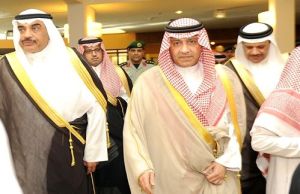
From the outset, Oman and the UAE had not been happy with the military union idea either as in their actions they were mindful of Tehran and were trying to build balanced relations with it. Clearly, they were reluctant to antagonise it by such questionable ideas, and they were more confident in their own internal stability, unlike the KSA.
Riyadh tried to crush the opposition to its plans and made a lot of efforts to ensure that Qatar (not without support from the USA) would stop pursuing active foreign policy and follow in the wake of Saudi Arabia. This was largely facilitated by the position of the UAE, who, like the Saudis, were seriously alarmed by the growing weight and influence of the Association of Muslim Brotherhood in the Persian Gulf region. It is thanks to their support that the Saudi royal family managed to get the military back into power in Egypt at the beginning of July earlier this year by making use of all its financial potential (the total funds allocated by the KSA and the UEA to the Egyptian military amounted to 12 billion dollars). During almost the same period, with Washington’s support, power changed hands in Doha, where young (just over 30 years of age) and inexperienced in political matters Prince Tamim got into power.
It seemed that Saudi Arabia’s victory that would have been culminated with the creation of a military and political union was very close. To achieve victory, all Riyadh had to do was finish off the Syrian regime, which it was hoping to do with Washington’s help. However, the September 2013 U-turn in Barak Obama’s policy towards searching for political solutions both regarding the Syrian crisis and the relations with Iran frustrated these plans completely and, right away, made the idea of a military and political union of the GSO irrelevant, at least for the time being.
This is what provoked strong reaction in Riyadh, where they had not expected either Barak Obama’s willingness to change his policy course or the active role on the part of Russian diplomacy in ensuring this manoeuvre. It became a surprise for Riyadh and a major setback for the Saudi intelligence service that it had been completely unaware of the American-Iranian secret negotiations – which had been going on in Oman for nearly a year and literally under its nose, at one of the best hotels of Muscat – which resulted in the resumption of dialogue between Washington and Tehran and successful P5+1 negotiations with Iran on its nuclear programme on 24 November.
Saudi authorities are now faced with a major challenge – either to continue the line towards confrontation with Iran or to try and fit into the world’s new trends. Judging by the solutions of the GSO summit in Kuwait, a definitive answer has not been found yet. The adopted solutions were half-baked both in regard to the Syrian crisis and the Iranian policy. Everything shows traces of a deep compromise that the Saudi leaders have had to agree to. But they have not completely abandoned their positions.
Although the idea of peaceful settlement of the Syrian crisis on the basis of Geneva-1 found support and nothing was said about the compulsory withdrawal of Assad, nevertheless the consent to Geneva-2 was provided with preliminary conditions: for example, the transitional authority that is set to be established after the conference should not include anyone from the immediate environment of Assad, whose “hands have been stained with the Syrian people’s blood”, the Syrian regime’s actions were described as “genocide”, and the Syrian opposition was beforehand announced the sole legitimate representative of all Syrians. Not a single word about the crimes of jihadists, but there is a requirement that “foreign forces” (that is, Hezbollah) should be withdrawn from Syria.
The agreement with Iran on its nuclear programme was supported but described only as the “first step” which has to be followed by a comprehensive agreement and stripping it of the nuclear weapon (as if it had it?!).
The solutions on the military and political union are half-baked as well. It has not been created, but the GSO countries’ joint military commanders have been defined. So who are the Saudis going to wage a war on?
Maxim Egorov, a Middle East political columnist, exclusively for the New Eastern Outlook online magazine.
